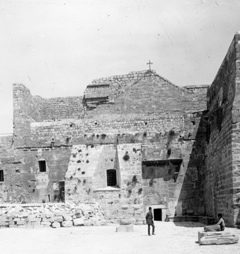 Why Bethlehem, of all places in the world? Why should the Savior of all peoples everywhere land here – in “the little town of Bethlehem”? Surely our wonderful Lord might have done better!
Why Bethlehem, of all places in the world? Why should the Savior of all peoples everywhere land here – in “the little town of Bethlehem”? Surely our wonderful Lord might have done better!
Heaven must have known, for example, that Rome was still in its ascendancy. Why not choose the capital of the civilized world, with its impressive infrastructure and power? Mexico might have been a strategic alternative, too; Teotihuacán was soon to become one of the largest cities on earth. Or how about China? Here was an advanced civilization in Jesus’ day – even then, perhaps, the most populous nation on the planet. And one out of five of our entire human family is Chinese today: just think if Jesus had been born among them! What a strategic move!
But Bethlehem?
The “little town” we sing about is really no more than a village. There must have been a bakery in town, at least; “beth lehem” means, literally, “house of bread.” Maybe travelers stopped by for a sandwich on their way to Jerusalem. We know that there was an inn in the town, too, a little smaller than it should have been. Yet Bethlehem was not exactly a hub of commercial activity. It was not a hub for much of anything, in fact. The prophet Micah called it “small among the clans of Judah” (Micah 5:2, NIV) – “the runt of the litter” (The Message). The place was a backwater, in many ways, a few miles south of Jerusalem, in the remote countryside of a smallish nation on the periphery of the Mediterranean world.
It has not fared much better since the Savior’s birth, either. In the second century, Hadrian completely devastated the city; the so-called “Nativity Grotto,” if still remembered, was probably lost forever at that point. (Saint Helena, it is true, erected the “Church of the Nativity” two centuries later on a site that seemed Christmassy to her, somehow.) The place was destroyed again during the Crusades. The Ottoman Empire annihilated the village once more in 1244.
On the other hand, this was David’s village. King David was the “runt of the litter,” too. In fact, Bethlehem and its famous son reflected an established heavenly strategy: to work from the periphery and the “runt” end of things. Not from royal Rome or the glitter of Teotihuacán. For his greatest and most spectacular miracles, God chooses “backwater” sorts of places and their unlikely kind of people. He makes them “by no means least” (Matthew 2:6, NIV). Bethlehem is “no longer bringing up the rear” (The Message). “For out of you will come a ruler who will be the shepherd of my people Israel….”
Bethlehem, you see, is any town. It is your town and my town. It is Baitadi, in the remote west of Nepal. It is Hovd, in western Mongolia. It is Cariamanga, in Ecuador’s southern mountains. It is Maralal, in Samburu District, in the north of Kenya. And it is downtown Bucharest, too, and teeming Nairobi, and Minneapolis and Los Angeles.
Bethlehem represents the great movement of the Advent and Christmas seasons. It is the movement of God’s own mission in the world. From the throne room of his excellent grace – to the needy byways of human hearts and communities, wherever they may be.
So this Christmas season, have a look for Bethlehem. Maybe there are needy byways in your town, too.
How silently, how silently, the wondrous Gift is giv’n;
So God imparts to human hearts the blessings of His Heav’n.
No ear may hear His coming, but in this world of sin,
Where meek souls will receive Him still, the dear Christ enters in.
(Phillips Brooks, 1867)